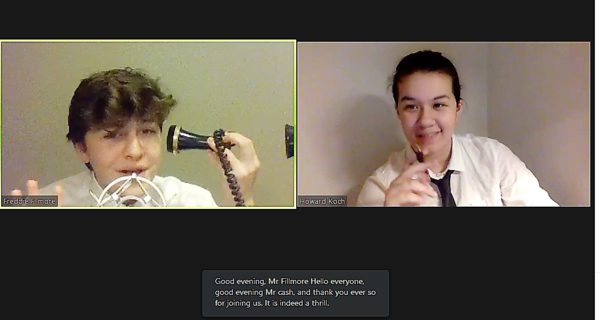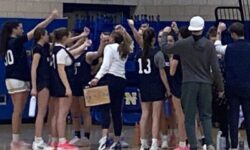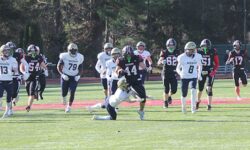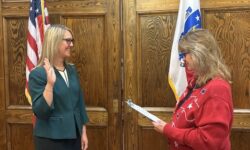Howard Koch and Freddie Filmore, played by Lily Oehlkers and Brian Curry briefly discuss the background of Welles’ recording.
By James Kinneen
Hometown Weekly Reporter
Decades before “Cannibal Holocaust,” “Ghostwatch,” “The Blair Witch Project,” “Mermaids: The Body Found,” or “The Buried Secret of M. Night Shyamalan” convinced supposedly savvier audiences with far more access to technology that the government was hiding the existence of mermaids, a local news broadcast had discovered an actually haunted house, the director of “Signs” could actually see dead people, or that Burkittsville, Maryland was home to a child-kidnapping witch, Orson Welles’ “The War of the Worlds” had Americans terrified that they were listening to a live broadcast of an alien invasion. With no way to hold plays for a packed audience due to COVID restrictions, on Friday night Needham High School Theatre presented “War of the Worlds: The Panic Broadcast,” as adapted by Joe Landry, via Zoom.
After Katherine Jones explained how the Zoom call would work (applause was to be done via chat section comments) the broadcast started with a little bit of a backstory, consisting of Lily Oehlkers’ Howard Cotch explaining the background of the original recording, like how CBS made them change certain real names and places. The network, for example, insisted on replacing “President Roosevelt” with a very Roosevelt-sounding-voiced “Secretary of the Interior,” while “Grover’s Mill, New Jersey” was chosen as the invasion’s ground zero because it sounded good, and was close enough to Princeton that it would logically make sense to bring in a professor character.
Next, we got our first our first of four satirically jingoistic commercials from “All American Brands,” this one advertising their line of flare guns, chainsaws and umbrellas, punctuated by the legitimately catchy recurring jingle “be a proud American… with All American brands!”
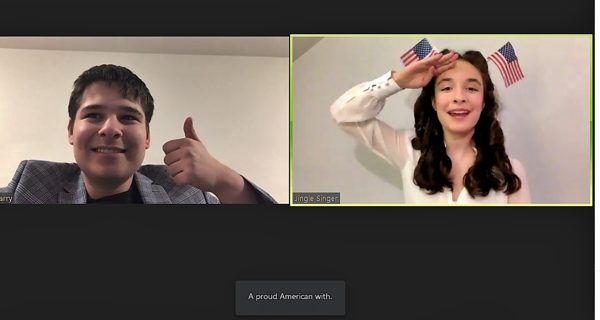
One of the things the play didn’t do was play the orchestral music the original recording would have, in full, instead briefly playing a few seconds of music and cutting it off to report on the invasion. Setting the scene for what was about to happen, we got an interview between Annike Downey’s Carl Philips and Katherine Rock’s Princeton Professor Richard Pierson, all about a mysterious gas explosions happening on Mars, before we were informed a meteorite had fallen on a farm in Grover’s Mill.
Next, we heard from a cop in aviators talking about the meteor, before an interview with the farmer on whose farm it fell. If it’s possible to chew the scenery in on a Zoom call in front of a plain white wall, Zach Wiseman was chomping the limited scenery down. I enjoyed every second of his over-the-top performance, and wish he’d been a much bigger character (though his "Secretary of the Interior" was very well done, even if not as much fun).
Annike Downey was quite believable as reporter Carl Philips, as was her detailed explanation of watching the aliens emerge from the crashed UFO and use their heat ray on some of the police, including Captain Lansing, who punctuated a cocky military man look by donning a backwards hat and a leather jacket, like a bully on "Full House." Listening to her speak in the very calm and cool, matter-of-fact news broadcaster style, I could see how a person could think it was real.
While many of the cast members dressed up, only Leyna Blume, who played Lieutenant Voght, a pilot whose aircraft gets shot down, shook their webcam camera, “Star Trek” style, to show that she was being violently tossed from side to side.
Brian Curry’s Freddie Filmore led us into a station break, before our second All American Brands commercial, this one concerning a couple buying each other guns to shoot bald eagles and American buffalo, as well as the wife and her new “lady gun,” purchased to feel safe through all the late nights the man spends working with his secretary.
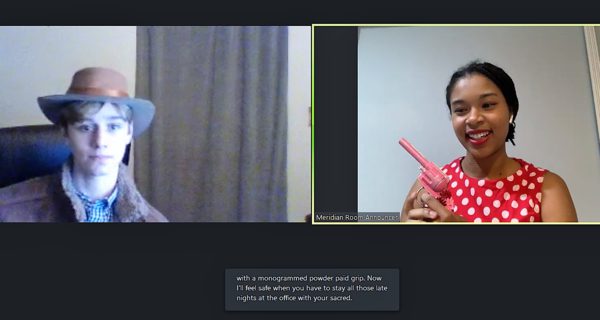
At this point, we cut to Claire Finucane’s John Houseman and Abby Hynes’ Orson Welles fighting each other about the panic being caused by the broadcast, mainly concerning whether they should try to destroy the recording to save themselves from lawsuits and possible criminal charges.
While this was the part of the story everyone knew - people panicking about the invasion in New Jersey - the recording actually continues with a long bit in which Professor Pierson wanders the country noting the carnage the aliens have brought about, running into a terrified survivalist and ultimately ending up in Times Square. This was especially interesting, because the audience likely never thought about, or knew, what happened in the original "War of the Worlds" broadcast once the fake alien invasion had begun. It is possible that some listeners might have believed a small town in New Jersey had been invaded, but a fake invasion in New York City would have been dispelled pretty quickly, even with the limited technology available at the time.
In the end, as you likely know from the Tom Cruise adaptation, the "alien invaders" die from a bacteria.
But the play continued with a scene in which Orson Welles fought with reporters and the police, noting that he used real places because HG Wells did in his story, and arguing the show was the “radio version of dressing in a sheet and jumping out of a bush yelling 'boo'!”
After an All American Brands commercial for a flamethrowing robot-filled bomb shelter (I suspect Joe Landry is a big “Fallout” video game franchise fan), we were treated to some of the fallout of the recording. When NBC led their news broadcast by saying “America has not fallen,” an entirely new group of people who had been listening to NBC, not CBS, became even more confused about Welles’ recording, which added to the hullaballoo, while Houseman claimed the reason it led so many newspapers’ front pages was because it was the perfect ploy for newspapers to portray the idea that radio (which was stealing ad revenue and readers from them) was untrustworthy and dangerous.
We learned that Campbell’s Soup ended up a sponsor of the Mercury Theatre, and that both Houseman and (to a lesser degree of surprise) Welles headed to Hollywood, where they were hugely successful (Houseman won an Academy Award for "The Paper Chase" in 1973). Finally, the play ended with journalists reading recordings of all the big events of the years, from Columbine to the Cuban Missile Crisis, all the way to the bombing of Pearl Harbor.
Overall, the play was really enjoyable. With sets and costumes so limited, the cast and crew managed to strike a balance between fun and serious. They didn’t have the resources to be period-perfect, and had a bunch of girls playing male roles, but it was well acted - and the anachronistic nature of the costumes (it looked like the survivalist had a Vietnam-era army jacket, the cop had aggressively eighties sunglasses, one girl was wearing AirPods, etc) made it more fun. And while there were some humorous bits, they didn’t go too far into the realm of absurdity and goofiness, which could wear thin very quickly. Amazingly for a Zoom broadcast, there were no technical issues over the call (kudos to the crew) and the only mistake I caught from the cast was when someone said “podcast” instead of “broadcast” - a very Gen-Z slip-up.
Void of an ability to do live theatre during the pandemic, Needham High's Theatre Department didn’t panic, they just put together a fun historical drama about a quirky bit of drama history.



